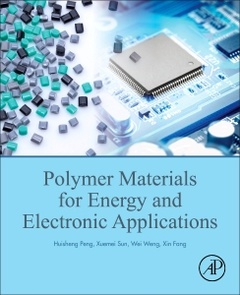Polymer Materials for Energy and Electronic Applications
Auteurs : Peng Huisheng, Sun Xuemei, Weng Wei, Fang Xin

Polymer Materials for Energy and Electronic Applications is among the first books to systematically describe the recent developments in polymer materials and their electronic applications. It covers the synthesis, structures, and properties of polymers, along with their composites. In addition, the book introduces, and describes, four main kinds of electronic devices based on polymers, including energy harvesting devices, energy storage devices, light-emitting devices, and electrically driving sensors.
Stretchable and wearable electronics based on polymers are a particular focus and main achievement of the book that concludes with the future developments and challenges of electronic polymers and devices.
1: Introduction
2: Synthesis and Design of Conjugated Polymers for Organic Electronics
3: Structure and Property of Electronic Polymers
4: Electronic Polymer Composite
5: Energy Harvesting Based on Polymer
6: Energy Storage Devices Based on Polymers
7: Light Emitting Based on Polymer
8: Electrically Driving Sensors Based on Polymer
9: Flexible Electronic Devices Based on Polymers
10: Summary and Perspective
Senior, junior scientists and newcomers from a broad spectrum of fields such as chemistry, physics, biology, materials science, electrical engineering, textile and energy.
Xuemei Sun received her BEng in Polymer Materials and Engineering from East China University of Science and Technology in 2008 and PhD in Macromolecular Chemistry and Physics at Fudan University in 2013. After her postdoctoral research, she joined Fudan University as an Associate Professor in 2015. Her work centers on the responsive polymer/carbon nanotube composite materials.
Wei Weng is currently a lecturer at the College of Materials Science and Engineering and State Key Laboratory for Modification of Chemical Fibers and Polymer Materials at Donghua University. He received his BEng in Materials Science and Engineering in 2005 and PhD in Materials Science in 2011, both at Shanghai Jiao Tong University. His research focuses on carbonaceous nanomaterials and high-performance composites mainly for energy storage devices, sensors and aerospace applications.
Xin Fang is currently a PhD student in University of Cambridge (UK). He gained his master's degree from Fudan University (China). In his master's projects, Xin focused on developing and translating carbon nanomaterials into applicable electrodes in wearable energy devices including dye-sensitized solar cells, lithium sulphur batteries and supercapacitors. Xin is now working at artificial photosynthesis in his doctoral study.
- Provides a basic understanding on the structure and morphology of polymers and their electronic properties and applications
- Highlights the current applications of conducting polymers on energy harvesting and storage
- Introduces the emerging flexible and stretchable electronic devices
- Adds a new family of fiber-shaped electronic devices
Date de parution : 08-2016
Ouvrage de 386 p.
19x23.3 cm
Thèmes de Polymer Materials for Energy and Electronic Applications :
Mots-clés :
actuator; aggregation structure; composite; conjugated polymers; device; diode; electrochemical; electrochemical cell; electrochromism; electrode; electrolyte; electronic; electronic application; electronic polymer; electrostatic; electrothermal; energy harvesting; energy storage; flexibility; flexible; flexible electronics; inorganic; light emitting; light-emitting devices; light-emitting polymer; lithium-ion batteries; lithium-ion battery; morphology; organic electronics; perspective; photovoltaic; piezoelectric; polymer; polymer electrochromic displays (PECDs); polymer light-emitting diodes (PLEDs); polymer solar cells (PSCs); property; sensing; sensors; solar cells; supercapacitor; supercapacitors; synthetic methods; thermoelectric; triboelectric



